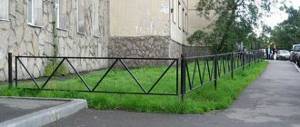Home / Complaints, courts, consumer rights
Back
Published: 11/07/2018
Reading time: 7 min
1
460
If it was not possible to resolve the conflict peacefully and the car owner continues to violate the law by parking his car in the wrong place, then eyewitnesses of such a violation have the right to complain about him to the appropriate authorities.
- Where should I complain? Contacting the traffic police
- Complaint to the district administration
- Online resource “Angry Citizen”
In order for the appeal to be considered and the culprit punished, the applicant will need to provide evidence. You can confirm the fact of parking a car on the lawn using photo and video materials. There are also some requirements for photographs and videos, only if they are met can such materials act as evidence. So, when planning your appeal, you need to consider that:
- The photo or video must be shot in good quality so that the registration number of the offender’s car can be clearly seen in the frame.
- In a photo or video, not only the car, but also the surrounding area should be included in the frame . It should be clear from the material where exactly the vehicle is located. You can record a house number or another nearby object.
A driver can avoid punishment for illegal parking in the following cases:
- it is impossible to establish a link between the location of the car and the residential area;
- there is no grass or other green space on the lawn;
- According to the project, the place where the car is parked is not a lawn.
Under certain circumstances, parking on the lawn is permitted:
- if the site is not recognized as a lawn in accordance with regional legislation;
- if the lawn is sown with damage-resistant vegetation;
- if there is a sign permitting parking or permission from a traffic police inspector.
It is worth noting that the Code of Administrative Offenses (CAO) or traffic rules does not define what a lawn is. If we focus on GOST 28329-89 clause 38, then, according to this document, a lawn is considered to be a grass cover sown with special grasses, which acts as a background in park structures and is an element of landscape compositions.
In regional regulations, the concept of “lawn” can be interpreted differently.
When is stopping on the lawn allowed?
The traffic rules established in Russia consider options for permissible stopping. Parking is allowed along the road or on the border with the sidewalk. There is no direct indication in the traffic rules that parking on the lawn is prohibited. However, such a standard is contained in the Code of Administrative Offenses of the Russian Federation, namely in Art. 12.19. This article reflects the prohibition of such an act by defining specific penalties for the offending citizen.
Here, paragraph one talks about a verbal warning or a fine for a citizen in a certain amount for ignoring parking rules. Specifics regarding lawns or other plantings are not specified, however, fines are applicable in these cases. At the same time, in federal subjects the fine is 5 times higher and amounts to 2,500 rubles . Accordingly, for other entities the fine is only 500 rubles .
A difficult issue for many applicants is the definition of an area with a lawn. In fact, any unpaved fragment bordering a roadway or pedestrian area can be considered such a site. Thus, a lawn should be understood as a plot of land in municipal or common property, even without the presence of specific vegetation on it (since this implies the possibility of growing it).
Are there any fines for parking on the lawn?
Yes, I have. Such fines are established at the level of the subject of the Federation. That is, each region will have its own fines for those parking on the lawn. In Moscow
for placing a vehicle on a lawn or other area occupied by green spaces, you can get a
fine of 5,000 rubles for an individual and 300 thousand rubles for a legal entity
under Article 8.25 of the Moscow Code of Administrative Offenses (by the way, there were precedents).
In St. Petersburg,
at the end of January 2021, amendments were adopted to the local law on administrative offenses, according to which the fine for placing vehicles on green spaces, children's and sports grounds, and areas for walking animals will be
3-5 thousand rubles for citizens and 150-500 thousand rubles for companies
(Article 32). The fine for companies applies if the car is registered to a legal entity.
Parking in winter
Indeed, in the Russian region, unlike many other countries, in winter it can be extremely difficult to see both the markings on the roads and, in principle, the location of organized parking spaces for parking cars in the private sector or near organizations. This has always been a kind of reason for citizens to circumvent existing legislation, attributing their offense to a lack of cleanup work.
However, in addition to markings on the road surface itself, organized parking lots often also have special signs that rise significantly above ground level and indicate places where you can park. Unfortunately, such signs are often absent in the courtyards of residential areas. Moreover, they cannot be detected in the absence of organized marked parking spaces and cars are parked simply on the asphalt area.
Where to go if your car is parked in the wrong place
If a violator wants to park near a residential building, the easiest way for residents is to contact their local police officer. His responsibilities include ensuring similar law and order in the territory entrusted to him. In order not to distract the traffic police on this issue (since real victims of road accidents can expect the service to arrive), it is allowed to complain here online on the official website.
Since, when refusing a call, a person misses the fact that a violation was recorded by an official body, he should independently verify the described situation with evidence in the form of photo or video materials. The online window on the site allows you to attach files of various formats here. With special principles, a person is still not prohibited from calling a traffic police inspector to the place of the alleged violation.
Who has the right to fine
As for the powers of the district police officer, he cannot issue fines. Rather, he will record the fact of a violation when parking the car on a green lawn and issue a resolution, which will be sent further to the court if the person is unwilling to pay the fine voluntarily. In this situation, only the court can satisfy or deny the requirements. In the first case, the resolution will go to the bailiffs for implementation.
The preparation of protocols and resolutions is also carried out by the traffic police with the help of official or video recording of offenses. In the second case, an important condition for issuing a resolution is a clear image of a car with individual license plates standing on the lawn. After the decision is issued, it goes to the violator. He has the right to pay the fine or complain to the court to have it cancelled.
If a person does not appeal the decision made against him in time, he risks the initiation of legal proceedings regarding his desire to park on a prohibited lawn. The meeting can also be held behind closed doors, after which the person will only receive notice of the decision made by the judge himself (based on the evidence presented by the prosecution).
When you won't be fined for parking on the lawn
- The car is parked on an eco-parking lot - a metal grate that protects the lawn from damage by car wheels;
- If the parking area is not a green area, a lawn according to a scheme approved by the municipality;
- A sign permitting parking has been installed at the parking area;
- Violations were committed when assigning a fine to the driver for parking on the lawn.
Thus, a motorist from Moscow parked her car in the courtyard of a high-rise building, but received a fine of 5,000 rubles. for parking on the lawn under Art. 8.25 of the Code of Administrative Offenses of Moscow (“Placing cars on green spaces”). Disagreeing with the decision, she filed a complaint with the Moscow City Court. Judge Lyudmila Sumina requested information from the AIS “Register of Green Spaces,” from which it was clear that the area where the driver left her car was a courtyard and did not have a lawn. The Moscow City Court canceled the fine to the car owner, since there was no corpus delicti of an administrative offense (case No. 7-0013/2018).
In Kursk, a resident of an apartment building complained to the local administration that Vladimir Korneev** constantly parks his car on the lawn. Local authorities recorded a violation and fined the motorist 3,000 rubles. He filed a complaint with the Leninsky District Court of Kursk and claimed that the car in the photo did not belong to him. Judge Elena Skripkina did not find any evidence in the case file that the area where the car was parked was a lawn. There was no protocol for examining the scene of the incident, and from the photographs of the car it is not clear when, where, by whom and under what circumstances they were taken, so Korneev’s fine was canceled (case No. 12-963/2018).
The administrative commission of the city of Cheboksary fined the driver 1,000 rubles. for parking on the lawn. Considering such a sanction illegal, he filed a complaint with the Moskovsky District Court of the city of Cheboksary. The motorist argued that, with the help and resources of the residents of the high-rise building, an eco-parking lot was built on the territory where he left his car, where he could leave his car. After studying the contract for the supply of construction materials, the estimate for the installation of an open parking lot and photographs of the car, judge Aleksey Nikitin found that the car was parked in a specially designated place, so he canceled the fine for the driver (case No. 12-1217/2015).
As a rule, courts do not cancel fines for parking on a lawn that was not visible due to snow. But its owner is obliged to notify residents that there is a lawn in the fenced area. If the driver did not know and could not know that he was driving onto a lawn, then he should not be punished, the expert adds: “After all, due to the snow and the lack of a fence, the parker cannot determine whether he is causing damage or not.”
How to solve a problem yourself without conflict and fines
Indeed, if citizens are adequate, the problem can be solved simply by asking them not to park on the grass or on land without an actual lawn. In this case, a similar request will have the greatest effect, for example, from a neighbor who is the owner of an apartment on the first floors when parking someone else’s car on the lawn directly under the windows of his property.
If the car owner switches the topic to the lack of organized parking for cars, it should be calmly explained that this issue should have been thought about before making a purchase. The responsibility for organizing a parking space rests not only with the executive authorities, but also with the owner of the car. An alternative is to buy a garage to store your car.
In the conversation, you should carefully emphasize the violation of the rights and interests of others by this car owner, mentioning a specific legislative article banning parking on lawns. The difficulty in this case can be caused by the actual absence of plantings or natural vegetation in the place where the machine is placed. However, the lack of a lawn is often associated with long-term parking.
Which institution regulates violations?
Based on the foregoing, it is obvious that parking of cars on vegetation/lawn is regulated primarily by law enforcement agencies represented by the local police officer or highly specialized traffic authorities. In this case, it is possible to involve judicial institutions or supervisory authorities in the work.
Who fines for parking cars on the lawn (makes a decision on imposing fines on persons who park illegally):
- district commissioner within the territory he serves;
- traffic police inspector;
- an ordinary police officer temporarily vested with appropriate powers.
As for the desire to complain to the court, this action is carried out either by a direct law enforcement agency or by the violator to appeal the charges against him. Also, to conduct inspections of institutions and the activities of their officials, a person can complain directly to the prosecutor’s office: territorial, and then general, canceling the decisions of previous authorities.
Alternative options for addressing the problem of cars on the lawn are public organizations that can actively conduct their main activities in the Internet space. Such services are often welcomed by government agencies. For example, the same traffic police sends a user to record traffic violations using the SafeRoads.rf portal.
This portal is designed to transmit reports of violations (including parking on lawns) in the field of traffic and the quality of road surfaces. Violations about parking on the lawn are not entirely appropriate here. However, even in this case the problem can be solved indirectly. For example, if you have to park on the lawn due to problems with the asphalt surface in the immediate parking area.
It is worth noting that the service, which is suitable for expressing opinions about offenses, was developed for citizens of Moscow. Its name is Moscow Helper. Here you can complain about cars on the lawn by attaching a photo of the identified episode directly from your smartphone. In this case, the photograph must comply with the standards. So the car should be well lit, the angle should display the make and color, as well as the individual number of the car.
Download Moscow Helper applications
What responsibility does the violator bear?
Fines for parking a car on a lawn may vary in different regions of the country. This is due to the fact that the fine is imposed in accordance with local laws on administrative violations. In addition, the amount will differ for different offenders.
For example, in the regions the fine amounts are set in the following range:
- for citizens - from 500 to 2,000 rubles;
- for officials - from 1,000 to 5,000 rubles;
- for legal entities - from 5,000 to 20,000 rubles.
In the Russian capital, the fines are higher. In addition, for parking on the lawn, the violator’s car may be towed to the parking lot. Car owners can check for fines online. If the owner of the vehicle does not agree with the fine issued, he has the right to challenge it in accordance with the law.
Punishments in different areas
Often, law enforcement officers can limit themselves to a verbal warning. However, the law allows them to issue fines in the name of the car owner who allows himself to park directly on the lawn. The size of such monetary penalties varies several times depending on the status of the subject: a city of federal significance or other subjects: ordinary cities, urban and rural settlements.
Moscow region
It is much easier for citizens to complain in the capital and achieve the desired result regarding illegal parking of cars on lawns. This is explained by the presence of specialized public portals for sending messages about the presence of cars on lawns and other violations, as well as the location in Moscow of the central offices of all government agencies (Rospotrebnadzor, the Prosecutor General’s Office, etc.), where citizens are allowed to complain.
However, the scale of Moscow and the Moscow region also determines the number of problems that arise here with cars on lawns and careless car owners who want to park in the wrong places. That is why a certain balance is maintained in opening the necessary services and applications to maintain the operation of the government system and initiating public control.
The farther from the Moscow region, the fewer questions need to be resolved regarding car owners and their unlawful attempts to park on growing lawns. And in connection with this, the level of need for additional measures to control the conscientious performance of their duties by motorists and the direct powers of public authorities is also reduced.
Other cities
In other constituent entities of the Russian Federation, the prerogative options for sending complaints about cars on so-called lawns are standard state executive authorities of territorial significance, as well as bodies of the supervisory and judicial system. In general, the scale of the problems here is not so extensive (relative to Moscow) and does not require the global development of additional resources for complaints.
How to report a violator yourself
In the age of digital technology and the abundance of online services (including for complaining about those parking on the lawn), citizens have numerous opportunities to contact the authorities and resolve issues of violation of their rights and interests remotely. Complaining online is allowed directly through the official websites of government agencies or with the assistance of intermediary organizations.
How to complain about car owners who want to park on lawns:
- Select the recipient of the complaint and send an email here with an attached photo of the car parked on the lawn (check the rules on photo format in advance) or call an employee to the scene to write a report.
- Wait for the decision to issue a resolution to the owner of the car who periodically parks on the lawn and the latter’s further actions.
It is worth noting that with any of these methods, consideration of the application must take place in a standard format. If the message is not anonymous and has contact information about the applicant, then the complaint will be accepted and verified after registration within thirty days. Postponements are possible, but only in a complicated situation that requires additional expert opinions, or if the recipient is incorrectly chosen.
How do you fix parking on a lawn?
- With the help of active citizens (you).
Photos and videos of violations are the main evidence. It is necessary that they clearly show not only the car itself on the lawn, but also the license plates of the offender. It’s also a good idea to make a reference to the area and take down a sign with the street name and house number. - Via a mobile application.
In Moscow there is a “Moscow Assistant”, in the Moscow region there is a “People’s Inspector”. Analogues also exist in St. Petersburg, Kazan, and should soon be launched in Voronezh. Please note that the functionality of applications may differ everywhere. It is not a fact that through the application you can send a complaint specifically about parking on the lawn, but you can complain about some other violations of landscaping rules. - In auto fixation mode.
MADI employees in Moscow, for example, record cars parked on lawns using a special software package “Mobile Inspector”. Based on auto-fixation, fine receipts are issued and sent out.










